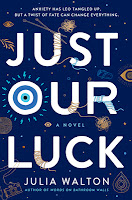Fans of 2017's Words on Bathroom Walls are certainly pleased that Julia Walton has published a second novel, Just Our Luck. While the previous book focused on a young man with schizophrenia and his attempts to navigate high school, this one follows a young man with anxiety, who is also dealing with the grief of losing someone close to him.
The Situation: Leonidas "Leo" Ermou has been punched in the face, and as a result, his father wants him to take a super-hardcore, military-style, self-defense course. He also has to periodically sit in a room with Drake, the boy who punched him, while the school guidance counselor looks on in the hopes that something will happen that will allow them to better understand each other. Leo is content to sit quietly and knit while in the guidance counselor's office, ignoring all of Drake's attempts at conversation. But the military self-defense class was immediately a no-go, so Leo manages to get himself enrolled in the yoga course in the same building. Unfortunately, this causes two other problems: first, if his dad ever finds out he is taking yoga over a defense course, he will be less than pleased. Second, the girl sitting at the gym's front desk that made this switch possible is Evey Paros, and his grandmother always told him, "Leave the Paros family alone."
The Problem: Yia Yia, Leo's grandmother, is the one who taught Leo to knit. He also taught her grandson not to lie. For the most part, Leo does his best to follow all of his grandmother's advice, except now he owes Evey Paros a favor for her help in getting him out of military self-defense class. It is not long before he is receiving cryptic texts from her, asking him to knit specific things, and going with her to strange locations to take pictures. Evey does not deny that this is all part of an elaborate revenge plan against her ex-boyfriend, but Leo goes along with it anyway. Sure, part of it is that Evey is pretty, and confident, and he kind of likes being around her, despite not liking being around most people...anxiety makes that hard. But Leo also remembers the curse Yia Yia told him about, the one that the Paros' put on their family generation's ago. He may not be 100% sold on the idea of curses and bad luck, but his anxiety has made him believe that something bad is always on the way.
Genre, Themes, History: This is a young adult fiction novel set in and around modern-day Los Angeles. Leo is a Greek-American teenager who lost his mother to cancer when he was young, and then also his grandmother a year before the events of the novel. He has diagnosed himself with both generalized anxiety disorder and panic disorder, and generally prefers to be alone, as well as left alone. In his view, it is because he was forced into a social situation that led Drake to hit him, which then led to both the visits with the guidance counselor, and his dad's belief that a military self-defense class is the answer. The story is mostly told through the journal entries Leo is made to make before and after the yoga class he is secretly taking, where he writes about his family's history, his anxiety, his constantly disappointed dad, school, and of course, Evey. Leo may be the center of the story, but it is Evey's strange behavior that will move him forward, even though he does not know what happened to make her act this way.
My Verdict: Leo is a complicated guy, but really not all that hard to figure out. His anxiety makes it hard for him to be around people; plus, he is still grieving both his mother and his grandmother. Oh, and he likes knitting, and photography, and recently took up yoga. It is the kind of character description that seems ridiculous when laid out like that, but the longer the story goes on, the more Leo makes sense as a human being, and a pretty delightful one. He is not a jerk, and is not unnecessarily mean to people, despite not caring for many of them. He is simply doing his best, and that is something that I know many readers of all ages can appreciate. There is a second part to this plot that is more about Evey, and while Leo's story is disconcerting for many reasons, her story will also be upsetting for many. Walton manages to bring it all together in a touching novel about grief, worry, and what it means to take control of your own destiny.
Favorite Moment: There is a point in the novel where it becomes understood that Drake is not a bad guy, and I love that moment.
Favorite Character: Drake is one of those people that would probably drive me crazy in real life. It is near-impossible for him to not talk, or move around and make noise all of the time. He feels the need to broadcast everything to everyone within earshot, with seemingly no idea how weird that is. Somehow, he works well as a friend for Leo, despite them being complete opposites.
Recommended Reading: I recommend Word on Bathroom Walls, as well as A List of Cages by Robin Roe.



